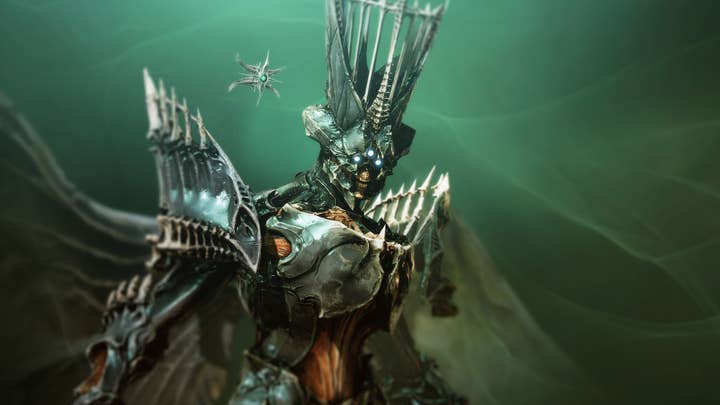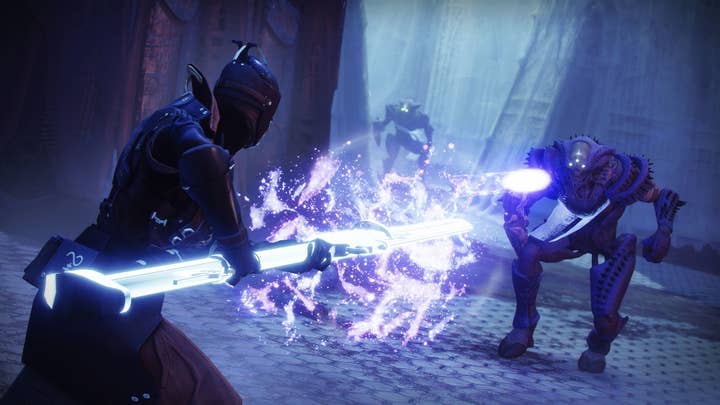Bungie chief people officer on transforming into a "digital-first" studio
Holly Barbacovi discusses how the Destiny 2 developer plans to create a remote workforce
The last two years have undoubtedly shaped how many industries function; flexible work is here to stay, and companies are shifting to give staff more control over how they do their jobs.
One studio leading the charge is Bungie, which recently announced its company-wide pivot to "digital-first." Hot off the heels of being acquired by Sony, the Destiny 2 maker is currently transforming to accommodate remote workers across several states in the US, while giving staff at its Washington-based HQ more options over how and where they work.
It's an ongoing process, but the firm has set itself up to hire remote employees in California, Oregon, Illinois, Florida, North Carolina and Texas, as well as its HQ state. Speaking to GamesIndustry.biz, Bungie chief people officer Holly Barbacovi says that the studio has established a legal entity in The Netherlands too, where it hopes to expand in the future.
"We're prioritising places where we know there are large talent pools of game developers," Barbacovi tells us. "Our recruiting team is seeing that there are people who are unwilling to relocate, and we don't want to lose the opportunity to work with those folks."
Barbacovi tells us that the transformation to digital first has been an ongoing conversion at Bungie, particularly as its headquarters in Bellevue is undergoing renovation.
"As we have gotten closer and closer to making some really critical decisions about that space, we felt like we needed to make a decision about how we were going to bring people back," Barbacovi says.
She also notes that the studio shipped The Witch Queen back in February, a Destiny 2 expansion that came together during the pandemic, with a fully remote workforce.
"After shipping Witch Queen, surveying employees and talking to leaders, we decided that we wouldn't mandate a return to office, but create an environment that encourages people to come in," she adds. "We want to have a spectacular space, but we want people to want to be there. If they are most productive working from home, then we want to give that option."

Barbacovi thinks that developing and shipping The Witch Queen expansion was mostly a positive experience for Bungie, and that the result contributed to the decision to make the change.
"Our employees felt effective working remotely, and they have really gotten used to the flexibility that work from home provides," she tells us. "It allows you to own your time, moving from this concept of core work hours with a commute, to core meeting hours with much more flexibility about when you're in office."
Another positive aspect of the change is that it allows Bungie to reach a more diverse roster of applicants than being rooted in Washington.
"Our employees felt effective working remotely, and they have really gotten used to the flexibility that work from home provides"
"This is something I'm really excited about, and the recruitment team was thrilled by this announcement because it just means that they have a wider talent pool," Barbacovi explains. "But between the recruiters and the hiring managers, the business unit leaders, they have absolutely prioritised going after more diverse developers, and we are definitely seeing results from that."
While leaning into remote work offers positive benefits, it does also present some challenges, particularly in recruiting graduates and lower paid positions. Remote employees run the risk of missing out on crucial onboarding due to limited communication with colleagues in a physical office environment. This is something Bungie hopes to combat by offering on-site training to interns and graduates.
"In 2022, we are going to have remote interns, but our intention is that the intern experience should be an on-site experience moving forward," Barbacovi tells us.
"With fresh college graduates that we hire full-time, we are intending to build a two-year programme that will have two or three dates in its first year. We'll then have cohorts of graduates that can start their roles at the same time, and then they will go through a series of really intentional training and engagement with different leaders.
"The second year would be ongoing engagement, but also turning them into ambassadors to help us onboard the next year's cohort."
The firm is also looking to hire an instructional designer -- someone that creates training courses, curriculums and guides -- to develop the programme that'll enable new employees to be onboarded together in a productive way.
"If we're going to enable remote work, we're going to have to change how we engage with and train individuals as well."

While the process of onboarding new recruits has evolved, Barbacovi assures that opportunities for existing staff across all disciplines will also have the same opportunities to progress in their careers, even when working from home.
"I've never subscribed to the idea that you need to be in the office and get facetime to progress your career," she tells us. "I think as a HR leader your results and your own personal desire for career progression need to be at the forefront."
"We will build talent management programmes that focus on actual results and capability, and rewarding that, and making sure that we still have really strong career development without that day-to-day, facetime in the office.
"It would be, from my perspective, pretty irresponsible to make this [remote working] decision without having that as a consideration."
This commitment goes beyond career progression too; Bungie wants to create a flexible space that fosters community building, "stickiness and loyalty."
"Staff are now able to think about their own comfort levels with coming back to the office, when the pandemic is not 100% solved at this point"
"Let's be clear, we're all learning here," she adds. "We're all going to have to test things out and and find what really works. Right now, my operating theory is we need to bring our remote workers to our headquarters four times a year, maybe two of those four are anchor cultural moments, where we're celebrating Bungie."
One of those "anchor moments" is the Bungie 'Pentathlon', which is designed to bring employees from across the company together to do something fun and spend time with their teams.
"It's a day of meeting people across the studio that you wouldn't normally collide with in a remote work setting," Barbacovi tells us. "Then you have the rest of the week to meet with your small team and do that collaboration that's just best done in person. This is how humans have interacted forever, and we don't want to lose that."
In the same vein, Bungie is evolving to manage staff in new ways, from supporting day-to-day needs, to checking in on mental health. The company is learning to spot concerns and pain points, and where remote staff may need support.
"It's a sensitive and a tricky topic, and it takes management finesse that is going to be inconsistent across your management population," Barbacovi says matter-of-factly. "But we have to build this capability, and we have confidence we can, so long as we're intentional about it.
"It's such an intensely personal issue that it's sort of co-owned by employees. There's the employer responsibility to provide really strong health insurance and time off for mental and physical health, managers being able to spot it and have that conversation, and employees self advocating for their needs. We have to do good at all of those things."

Barbacovi points out the "sense of relief" that Bungie employees have exhibited as a result of the company-wide changes, as well as its decision to not demand a return to its physical office.
"We aren't going to mandate a very rigid structure, we're letting them co-own their employee experience with us," she says. "Employees want certainty. The most positive thing I'm hearing is 'thank you for the certainty that you're not going to demand that I'm in the office.'
"Staff are now able to think about their own comfort levels with coming back to the office, when the pandemic is not 100% solved at this point."
"One of the big things that we learned was how important it is to be transparent about your processes"
Bungie faced criticism at the back end of last year following an IGN report that the studio had suffered with crunch, sexism and abuse across its leadership teams. The outlet spoke with 26 current and former employees who shared their experiences of such during their time at the studio. We asked Barbacovi if the company has addressed these allegations since the report came to light, and how Bungie intends to improve conditions.
"That was a super tough read, and it was incredibly regrettable to hear about employees experiences, it's certainly never our intention for anyone to leave Bungie feeling like they've had anything other than an amazing career experience," she tells us.
"One of the big things that we learned was how important it is to be transparent about your processes, and to articulate what you are going to do to address an employee's concern. You don't always have the outcome that they're happy with but if they understand your rationale, and you haven't just left it under a cloak of confidentiality, you can at least get to a point of understanding."
Barbacovi also tells us that Bungie has published its investigations process to its internal site, so that staff can fully educate themselves on the process and what to expect should they need to engage with it.
"As a HR manager engages with an employee through a concern, they'll understand how we're going to progress through the investigation and address it, and be really clear with what the outcome is and why."

